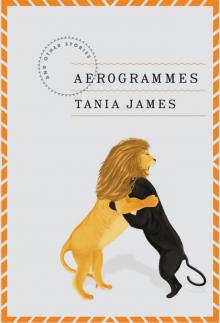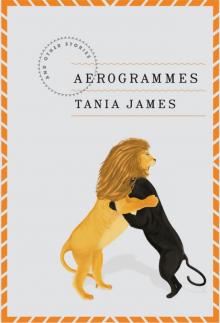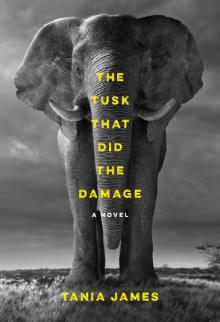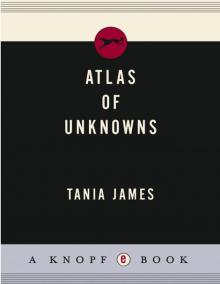- Home
- Tania James
The Tusk That Did the Damage Page 2
The Tusk That Did the Damage Read online
Page 2
“Are you going Buddha on me?”
Teddy didn’t answer, thus had gone Buddha. Going Buddha was central to his process, rendered him able to cruise into a frenetic situation armed only with a camera and instinct. Neither of us knew what the shoot would entail, but a rescue mission involving elephants was destined for frenzy.
We careened through plantations of coffee and tea, rows of bushes ribboning over the shallow slopes, bedazzled with bright red berries. A silver oak shimmied against the wind, its trunk a smear of marigold fungus. Easier to miss were the ditches carved around the plots, meant to keep wild elephants from snacking on the berries. From time to time, a mother and calf would loot the bushes, and the calf would slip and tumble into a ditch, out of its mother’s reach.
This was where Dr. Ravi Varma and his team would intervene. This was what had obsessed me for a year, what Teddy and I had taken three planes and a train to film.
I was the one who’d brought the idea to Teddy in the first place. Fresh out of college, we’d been looking for a subject for our first documentary feature when I learned about Ravi from an in-flight magazine. The photos of fuzzy elephant calves hooked me for the usual cutesy reasons; the description of the veterinary doctor glowed with dramatic potential.
Dr. Ravi Varma spends his days, and most nights, at the Wildlife Rescue and Rehabilitation Center in Kavanar Wildlife Park. His most prized possessions include his camouflage sneakers, his mediocre rum, and his twelve charcoal T-shirts. He prefers charcoal ever since he made the mistake of wearing white to an elephant calf reunion. The mother elephant spotted him easily, bright as a bulb amidst the green, and gave chase.
I learned that Ravi Varma was the head veterinary doctor at the Wildlife Rescue and Rehabilitation Center, known for his roughrider methods at animal rescue. He had pioneered the “calf reunion,” a technique that few vets dared to attempt on stranded elephant calves.
“There is a common fallacy here that elephants will reject any baby touched by human hands,” Varma said. “What we have learned is the reunion must be instant—speed is the key.”
We tracked down Dr. Varma, and after a slew of calls, he reassured us that there would be no shortage of rescues and calamities to film. I sent off a handful of grant applications and won two. Teddy’s father, a hand surgeon, bought him a camera and sound kit that outpriced my car. In the fall of 2000, we flew to South India with equipment bags slung over our shoulders, all of which airport security examined slowly and grimly.
For the past few months, Teddy and I had been living at the Rescue Center, a period of Pax Romana in which zero calamities had taken place, resulting in footage that had all the depth and nuance of a promo video. Once or twice—and much to my dread—Teddy had suggested that we include a Morgan Freeman–esque voice-over, a tall order, as Morgan Freemans do not grow on trees. “You have a nice voice, you could do it,” said Teddy, but I’d tried voice-over once before and was mortified when the playback revealed the voice of a breathy mouse performing spoken word. No way in hell would I try that here. I wasn’t expecting perfection from the film, but I wanted to stand behind every frame, every choice. Other people my age had reels and résumés; all I wanted was a single work that could speak for me, even if that work was a little uneventful.
We were set to leave for the States in two weeks when, in a last-minute break, Ravi called us from his mobile, already on his way to the calf rescue. Here at last was the disaster Teddy had been waiting for, back when a fallen calf was the biggest disaster we could imagine.
By the time we arrived, Ravi’s team had been working for three fruitless hours. We edged through the men who had gathered to watch. Teddy raised his camera, but all I could see was a dozen lushly haired crowns, not a bald spot among them, a phenomenon Ravi proudly attributed to coconut oil.
Teddy moved through the crowd with a detached yet pleasant expression, as if accustomed to being two feet taller than everyone around him. I was just as conspicuous with my coppery bun, my yellow Windbreaker, my boom—a long-handled mic with a furry wind guard angled at the end. Whenever we filmed, I expected everyone to turn and surround us like magnet filings to steel, but at present all eyes were fastened on the cow elephant in the distance.
She was hovering over the edge of the ditch. I couldn’t see the calf, wedged somewhere inside. The elephant flapped her ears at us, as distressed by her fallen calf as by the shore of our tiny, leery eyes.
I questioned a man whose button-down shirt, a psychedelic weave of pink and orange, suggested a knowledge of English. Puffing up before the lens, the man said a baby elephant was in the ditch, and the Forest Department had already spent a battery of blanks to scare away the mother and rescue the calf. The mother was unbudgeable, kept crying out and tossing clods of dirt into the ditch, as if to build a ramp. “She is very upset, see. And if these Forest Department people get too close, she will abandon the calf. Once the human touches the baby …” He shook his head, clasped his hands behind his back. “Mother will leave it behind, no question.”
“So then what happens to the calf?”
“It will be captured, trained, and on like that.”
We watched the elephant rummage her trunk through the ditch. I’d been looking at elephants so long I forgot sometimes what a magical organ the trunk was, like an arm exploding out from the middle of the face, packed with enough muscle to knock down a tree, enough control in its tiny, tapering finger to grip a lima bean. But even that miraculous limb couldn’t save the baby. The mother stood there, withering before our eyes. Huge and forlorn, pugnacious and bewildered.
I managed to say thanks before Teddy hustled me toward the crowd near Ravi’s van. He was sitting in the back, hefting onto his lap a caboodle of vials and jars, needles of nightmarish length. Teddy scooched into the van and swung the camera onto the oglers at the bumper, while I extended my mic, adjusted the dials on the DAT at my hip.
“Aha,” Ravi said, without looking up. “The media.”
Months of almost daily filming had put Ravi at ease with the camera, attuned to the sort of information we needed, the sound bites that would pop on-screen. He lectured, unprompted, while plugging a syringe into a small jar of clear fluid. “This is xylazine-ketamine, for the tranquilizer gun. Tranq is only the backup option. First we try the rubber bullet.”
“Why not start with the tranq?” I asked. Teddy homed in on his hands: deftly twisting, injecting.
“She could fall, break a leg. And what if she is still asleep when we get the calf out? We can’t babysit the thing; she won’t take him back.”
The crowds parted for Ravi, their reverential eyes on the tranq gun. He summoned a huddle of forest officers and Bobin, his assistant. (At first, the name “Bobin” had sounded to me like a clerical error, but as Ravi’s wiry sidekick, Robin to his Batman, Bobin sort of made sense.)
With Ravi in the lead, the team waded into the aisles between the bush rows, guns raised. The crowd had turned quiet. Teddy had flipped out the camera’s LED screen, glancing up and down between screen and ditch.
The elephant swung her body around, squaring herself with us, and at once her fear and fury plunged through me, something buried in the bones, whetted on years of running from men with guns. She growled low, whipping her ears; the men closed in. Only Bobin moved unarmed, some rope contraption coiled around his shoulder, a badge of sweat on his lower back.
At Ravi’s shout, a forest officer fired the rubber bullet. Missed.
In answer, the elephant opened her lungs and screamed. My stomach dropped; my dials hit the red zone.
Another gunshot—the elephant’s rear leg buckled. The rubber bullet had caught her in the haunch. She fled, hobbling, and the team was sprinting to the ditch and before anyone could tell us otherwise, Teddy and I were sprinting too.
The calf was on its back, stubby legs held aloft. It bleated, dazed, while Ravi and Bobin tugged a sling around its torso and, with the help of the team, dragged the calf aboveground. It lay on its
side, panting. The mother bellowed from afar. As Bobin undid the harness, Teddy knelt to the level of its eye, a black magnet to Bobin’s every move.
Finally, the team propped the calf on its feet. Ravi barked at the others to flee. He grabbed my arm, the mother thundering toward us. I called for Teddy, still running, unsure if he was behind me or beside the calf, and getting no response I wrenched my arm free, even as the elephant’s thud was still hammering from beneath the earth.
I turned to see Teddy filming. The camera was fixed to his chest in order to steady the shot. His face was rigid with fear, barely breathing or blinking as the elephant trundled up to her calf. Twenty yards stretched between Teddy and the elephants, a distance the mother could have closed in seconds. Yet he stood there, as still and spellbound as the rest of us.
The cow touched the calf on the crown, the nape, the wobbly trunk, which lifted, weakly, like a question mark. Her trunk ministered to his in ways at once intimate, familiar, mysterious.
The mother elephant raised her head, leveling her gaze upon Teddy. What happened next would become a subject of debate during an NPR interview, the question of whether the elephant’s gesture was, as Teddy would claim, a sign of gratitude. His fellow guest, a quippy animal ethologist, would dismiss the claim, accusing Teddy of “human-centric assumptions of animal consciousness.”
“That wave, as Ted here put it, could have meant anything. It could have been a sign of anger, even warning. It could have been joy. But gratitude is a human expression, learned by hand-reared creatures. I mean, look,” the ethologist would add, with so baffled a laugh it was like Teddy had claimed the elephant had curtsied, “a wild animal does not say thanks!”
I would have locked horns with that guy. Had he ever watched a calf suckle its trunk while it slept, whimpering from some secret dream? Had he ever watched Juhi, the oldest girl calf and self-assigned matriarch, drape her trunk over the youngest at a stranger’s approach? I’d witnessed these moments on my occasional solo shoots, though none would make it into the final cut. By then it was Teddy’s film, the whole thing practically shorn of my presence. I used to believe I was blindsided by how it happened, but I should’ve seen where I stood, ever at the periphery of things.
The confrontation lasted only a few moments. The mother elephant whipped her trunk up and down, three deliberate times. Teddy held the shot long after she turned and glided on, her calf in tow, a blot barely higher than the bushes on either side. Through my headphones, I heard the shivering leaves and, beneath that, at a frequency felt only by me, a pulse of envy.
The Elephant
Each night the Gravedigger tossed in his sleep. He woke breathless with visions of ropes and rough hands. Rifles fired through his dreams.
His cries woke the girl calf that lay in the cell next to his. She rumbled low and testy through the dark, then fell quickly back to sleep, forelegs bundled, mouth ajar. He closed his eyes, his mother flitting across his lids, as warm and alive as she’d been not five days before. He stared at the girl calf through the web-strewn slats, the pink wedge of her tongue. He stuffed the tip of his trunk into his mouth.
The anakoodu was built of bamboo and dark mossy wood, with a high tin roof that chattered when it rained. A fence split the space into his and hers, each furnished with a stuffed burlap sack and nothing else, only the ghosts of other calves who had come before them. The air sagged with their smells.
During the day, the Gravedigger ran his trunk around the bars. He patted the ropes that bound them together. He climbed up the bamboo with his front feet, reaching his trunk through the slats. His snout closed like a fist around passing scents. Even after he grew tired of climbing, he kept tracing the knots, crisscross, crisscross. It became a thing he had to do, for buried reasons.
§
The pappans were hotheads, buzzing, restless, rotten smelling. Five were assigned to the anakoodu. The Gravedigger hated all but Old Man.
The days began and ended with Old Man, who was not the oldest and yet seemed a higher authority than the others. They worked quickly and carelessly, but Old Man took his time in his steady assessment of the calves. He chiseled their toenails with a metal file. He oiled each crack and crevice. With firm fingers, he found the knots of hurt and rubbed them until the Gravedigger purred and the girl calf whined for her turn.
He was the only pappan who bent low and let them drape their trunks along his neck. He had no trunk with which to return the gesture and staunchly refused to allow their trunk tips into his mouth. Still it was a comfort, to touch and be touched.
Yet touch could be a cruel teacher. One day, Old Man stood before the Gravedigger in the anakoodu. In his fist was a long stick, capped by a metal talon.
!! said Old Man. !!
The Gravedigger stared. Old Man wore a strange new face, hard and blank as a wall. He reached out and tugged sharply on the Gravedigger’s left ear. The Gravedigger squealed, but Old Man kept pulling until the Gravedigger swerved to the left.
!!! said Old Man. !!!
A sharp tug to the Gravedigger’s right ear. He squealed, swerved right.
!!
!!!
!
!!!!
On and on until the Gravedigger could extract a meaning from each ugly note. Left! Right! Stand Still! Kneel!—the last learned by the whack of the stick across his flanks. Pain pulled his mind to a taut and terrible line, its only goal: to do whatever would prevent the pain.
Only at bathtime did the Gravedigger resist. He knew the bad hour was approaching by the tourists who thronged outside, chattering, buffooning, baring their teeth, cunning as monkeys. Their noises blurred to a hiss, coiling all around him until he could not breathe.
It began with a scraping sound; Old Man slid out two of the wooden boards, the square of sunlight parted by his shape. In the early days, Old Man tied a rope around the Gravedigger’s middle in order to tug him to the water. Once the Gravedigger learned not to tug back, to beetle along in silence, the rope was undone.
They proceeded in line: Old Man, the girl calf, the Gravedigger, and two more pappans. There was the spitter, who continually shot red tongues of paan out his mouth, and the squat one, whose breath simmered with liquor. Every so often, either the spit or the squat would bark at the Gravedigger, for reasons beyond his knowing. Sometimes he cut a hot fart to shut them up.
The crowd followed at a distance, clucking along, as all five stumped single file across the open and down a slope. There the trail spread into the riverbank. As soon as the Gravedigger caught a murky, algal whiff, he panicked and tried to turn back, but the pappans shoved him onward.
When they reached the banks, the girl calf trotted into the lake and stopped a few feet shy of Old Man, who took a wide stance on the rocks. Murmuring gently, he tossed water on her back. Occasionally he scooped a handful into his own mouth and gazed out over the breeze-pleated currents. The girl calf glittered in the sun, her hair bejeweled with droplets, her eyes drowsy with pleasure.
The Gravedigger was miserable. They kneed him into the water and tugged on his ear. Again and again they doused him with water, and again he was at the lake with his clan, and there was the tusker tossing water and there was his mother spraying him in the mouth. He burrowed his face into the girl calf’s side, but there was no escaping what all he remembered.
§
Twice a day, the adult elephants nodded past the anakoodu on their way to the lake, clanking chains. The pappans rode on their backs or walked alongside.
The first time the Gravedigger had glimpsed all the giants together, he thrust his trunk through the bamboo bars and keened. Cows and cousins of varying browns and grays. He thought he scented his mother among them.
He cried out as they passed, but not a one turned her head, as if they were less than strangers, not even the same kind. Yellow-green urine stained their hind legs. An alarming absence in their eyes.
Every night, the Gravedigger escaped. He closed his eyes and saw himself swimming steadily acro
ss the river, led by the scent-seeking periscope of his trunk. He saw himself break the surface and climb onto the opposite bank where his mother was waiting. There he was, his trunk wrapped in hers. Whatever hurt or sorrow befell him was not really happening to him. He was on the other bank with his mother. He was not here.
§
So began the Gravedigger’s second life, a tale that would remain incomplete without a proper portrait of Old Man. In the end, the newspaper stories would ignore almost entirely the late T. S. Mahadevan; some would neglect to mention his name. Yet he would live for another decade in rumors and rhymes, summoned like a spirit that would never know rest.
At the Sanctuary, most of Old Man’s days were the same. As overseer, he sat on a bench outside the shack he shared with three others and watched the calves. Two at a time, the calves passed through his anakoodu, where he coaxed and bullied them from the brink of despair. His was an arsenal of soft words and soft blows, plus the odd nugget of sugar. Soon as he roused a calf from near dead, it was yanked from his anakoodu, another pair of needy eyes in its place.
In his lap lay the logbook. His tiny script crawled over every corner, defying the faint blue lines. He turned the crackling pages and scanned the names of his former orphans. Each flickered brief as a firefly in his memory: Asha, Arjuna, Balram, Balachandran, Ramachandran, Kamini, Ashwini, Saraswati, Omprakash, Ramprakash, Babu Prakash. So many names and nowhere among them his own.
His father had been pappan to only one elephant, Kannan, for the whole of his life. What Kannan taught Appachen he passed to his son on slow, humid nights such as these. If an elephant tosses dirt on his back, he is comfortable. If an elephant stands utterly still, he is troubled. An elephant will only lie down to sleep if he trusts the company he keeps.

 Aerogrammes: And Other Stories
Aerogrammes: And Other Stories Aerogrammes
Aerogrammes The Tusk That Did the Damage
The Tusk That Did the Damage ATLAS of UNKNOWNS
ATLAS of UNKNOWNS